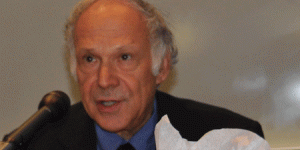Multimedia
Taiwan Pres. Ma Ying-jeou on Cross-Strait and US Ties, Followed by Los Angeles Discussion
Via video, Ma spoke to CSIS and other centers. His presentation and discussion was followed by analysis and commentary from Los Angeles and Taipei.
Patrick James
Patrick James, Director of the USC Center for International Studies, discusses points raised by President Ma Ying-jeou during his video conference speech on April 9, 2014.
Stanley Rosen
Stanley Rosen, Professor of Political Science at USC, discusses points raised by President Ma Ying-jeou during his video conference speech on April 9, 2014.
Video: Worsening Sino-Japan Relations: Implications for the US
Professor David Arase discusses Sino-Japan-US ties.
Interview with Geoff Dyer
Geoff Dyer discusses his new book, "The Contest of the Century," which is both an inside account of Beijing's new quest for influence and an explanation of how America can come out on top--an essential book for businessmen, politicians, financiers, and anyone interested in current world affairs.
The Globalization of Chinese Soft Power - Falk Hartig
Falk Hartig presented at the conference titled "A New Era in Cultural Diplomacy: Rising Soft Power in Emerging Markets."
The Globalization of Chinese Soft Power - John Layton
John Layton presented at the conference titled "A New Era in Cultural Diplomacy: Rising Soft Power in Emerging Markets."
The Globalization of Chinese Soft Power - R.S. Zaharna
R.S. Zaharna presented at the conference titled "A New Era in Cultural Diplomacy: Rising Soft Power in Emerging Markets."
The Globalization of Chinese Soft Power - Jennifer Hubbert
Jennifer Hubbert presented at the conference titled "A New Era in Cultural Diplomacy: Rising Soft Power in Emerging Markets."
Assignment: China - China Watching
This segment of the USC U.S.-China Institute series on the work of reporters for American news organizations looks at the period 1949-1971, when most Americans could not visit the People's Republic. Though some non-U.S. citizens reporting for American organizations did manage to get into China, most reporters had to watch what was happening in China from Hong Kong.





